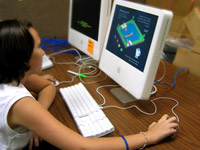New Mexico State University Learning Games Lab Offers Parents Tips on Holiday Shopping
The holidays are around the corner and for many parents, video games are certain to be on your children’s lists. Buying video games for family members can seem daunting: adults often don’t play games with kids, and don’t know what to expect or what is appropriate. More than just providing entertainment, there are many fantastic game options that encourage physical activity, help kids learn, and facilitate family togetherness. Here are some simple guidelines from Barbara Chamberlin, PhD, Extension Instructional Design and
Educational Media Specialist at New Mexico State University.
1. Refer to the Entertainment Software Ratings Board (ESRB) ratings printed on every game package as a guide. Many of the games your kids may hear about and request could be inappropriate for their age. Based on violence, language, and mature activities or themes, the ESRB has a consistent rating system for every
game sold. A game will be rated for “Early Childhood”, “Everyone”, “Everyone Ages 10 and Older”, “Teen”, “Mature”, and “Adult”. Titles rated “Mature” may contain intense violence, blood and gore, sexual
content and/or strong language, and should be purchased only for gamers 17 and older. Be sure to check the icon on the game package: many of the games your child may hear about and ask for are rated “mature” and are likely inappropriate for young teens. See more information about these ratings at esrb.org.
2. Replace some passive screen time with active screen time. Instead of using only their thumbs while relaxing on a couch, your gamer can move jump and swing through a series of “active games” or “exergames”. ames like “Dance, Dance Revolution”, in which players dance on a physical mat while following music and stepping to the beat in the game, can burn considerable calories. Nintendo’s Fit board, used with their Wii console, facilitates games that require balance and stability, including yoga, pilates and strength training. Active games include games that challenge players with score and fun activities, as well as more interactive fitness programs. For more information, visit learninggameslab.org and exergamesunlocked.org.
3. Encourage educational gaming. Educational games aren’t easy to find, they usually aren’t highlighted at the front of the store with their better-selling cousins. However, several quality titles exist. Rather than look specifically for grade-specific titles, browse the shelves for titles that include language, math, and science development. By integrating these titles into your family’s collection, you take advantage of the clear strengths games have in encouraging learning, and you demonstrate the importance of learning outside of the classroom. Ask your student what types of educational games are interesting and you may find an entire section of the game store or online product search that your children have yet to explore.
4. Find ways to play as a family. One of the benefits to systems with nontraditional interfaces (or games where you don’t have to use only your thumbs or a joystick) is that families tend to play together. Grandma, your teenager, and your 6 year old can all easily use the Wiimote with the Nintendo Wii to bowl or even play tennis.Instead of gaming being an isolated activity in which your child plays on their own, encourage a family game night where family and friends can all play together. Get involved in the gaming life of your children
and ask them to show you how to play.
5. Depend on the experts. Use your children to find the best games. Tell them your goals, and give them guidelines, such as including at least two exergame and educational games on their wish lists. Store clerks know games, often because they are young adults who play them. Let them know the ages of the children in your family and if you are looking games that the family can play together, educational titles, or exergames. Commonsensemedia.org, kidsfirst.org and other websites are designed to help families identify age appropriate and beneficial games. Search “educational game recommendations” in any search engine to find additional blogs and online resources to help in your search. By taking an active role in choosing and evaluating the games your family plays, you can find significant benefit in how gaming time impacts your family. Games are fun, even for adults.
For more information, visit http://www.learninggameslab.org/about.html


